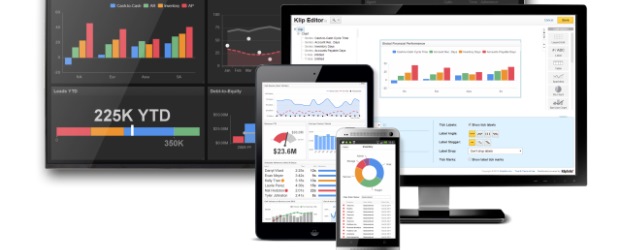The concept of SaaS (Software as a Service) is where today’s app-driven computing environment puts its most creative solutions. There are a lot of great SaaS apps online that streamline daily operations, increase productivity, and let companies keep up with the ever-evolving world of social media communication. The following are five excellent SaaS apps with businesses in mind.

Image courtesy of Shutterstock
1. ToutApp
Recent studies have shown that email marketing is making a big comeback in terms of sales conversions, even though many companies have focused on third-party social media platforms and non-traditional marketing to catch the eye of a more tech-savvy generation.
ToutApp gives sales teams robust email marketing tools that fully integrate with CRM and Web analytics for a one-stop communications management experience. ToutApp goes beyond the simple email template creation and prioritization of free apps like Gmail by linking multiple sales seats, tracking data across platforms, and incorporating sidebars from other popular systems like Salesforce. ToutApp starts at $30 per month and scales for larger teams and premium packages.
2. DivvyHQ
In the world of online marketing, content is king. The high volume of content that goes through any given marketing department can be staggering, so DivvyHQ simplifies the process with a highly responsive editorial calendar. It has space for ideation, as many specialized calendars as the team needs, workflow management, email support, and publishing assistance.
It’s is a great system for keeping track of today’s deadlines, tomorrow’s brainstorming sessions, and a full year’s content strategy. The $25 per month Lite package familiarizes users with the calendar functions, with social add-ons for the $95 Pro package and custom tools exclusive to the $195 Enterprise versions.
3. Parse.ly
Once the content is live, performance analytics describe just how effective each deliverable is. Parse.ly goes several steps beyond standard analytic software by defining both the big picture and the little details of content performance. The app tracks the performance of each website, pieces of content, authors, and even referrers. Parse.ly is definitely designed for enterprise-level operations, offering a starter package at around $2000 per month that covers ten seats and up to 1 million unique monthly visitors. Organizations handling larger visitor numbers and seats can negotiate custom plans.
4. Square Register
The most recognizable name in point-of-sale (POS) iPad transactions apps is still the leader in terms of convenience and pricing. There are a lot of competitors out there for POS credit card readers, from Intuit to PayPal Here, but Square Register offers many of the same features and unbeatable pricing.
The app and card reader attachment are free, and it features an intuitive inventory management platform. The big selling point is Square Register’s scalability. Smaller businesses pay a 2.75 percent transaction fee on every swipe, but businesses handling a large volume of daily swipes can opt for a $275 per month flat service rate with no charge on swipes. No other POS app grants a flat fee for larger businesses, likewise with non-mobile card readers.
5. Dashboard
The startup realm is hungry for sleek, intuitive SaaS apps that help them work more efficiently and reach more people while operating with smaller teams and budgets. Dashboard brings the challenging experience of networking, as well as collaboration and competition into the simultaneously friendly and data-driven world of analytics.
Dashboard has social components that allow startup founders to communicate with one another in a virtual space, making it easier to seek advice and develop lasting mentorship relationships. At the same time, the app lets users create benchmarks that compare current progress with a portfolio of past achievements to keep everything on task. Dashboard is free and connects through existing platforms like AngleList and Indicate.io.
SaaS apps keep companies of all sizes lean, fast-moving, and connected — both between departments and with end users. They take classic software concepts that have long been separate and integrate them into simple, streamlined tools that move as quickly as the data they process.
SaaS is getting smarter every year. The right apps are vital investments for companies eager to keep up with the complex world of data-driven business.






